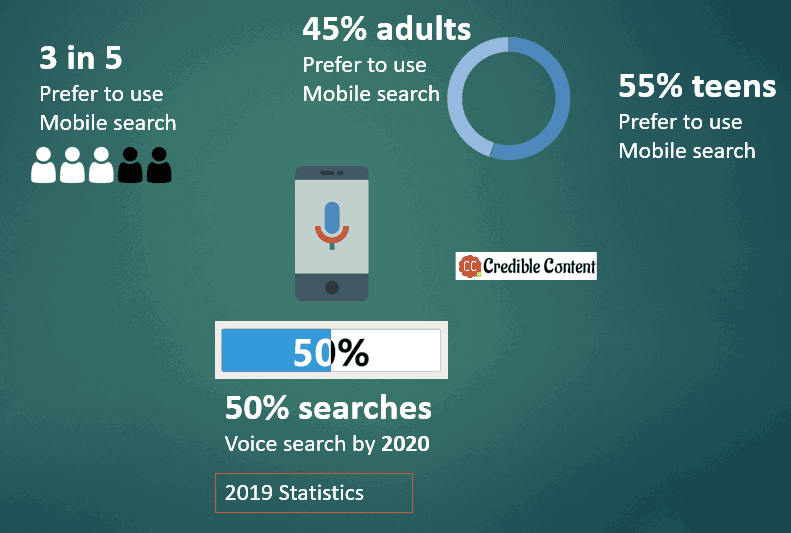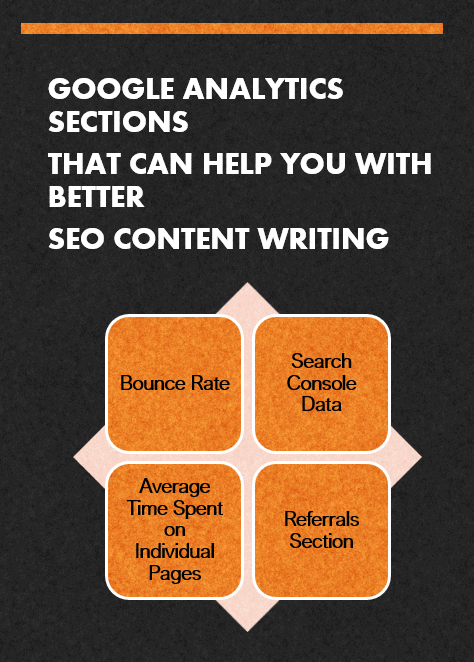
Optimizing content writing for voice search
Voice search optimization means writing your content in a language that people use when speaking.
You write shorter sentences. You avoid using complicated words. You write in the form of questions and answers.
30% of all search is voice search these days. More than 60% of Amazon Echo and Google Home users don’t plan to go back to using keyboard for looking up for information.

2019 voice search statistics
Voice-enabled interfaces are increasingly being used, including Siri, Cortana, Amazon’s Alexa and Google Assistant.
As the number and sophistication of voice-controlled and voice-enabled devices increase, it is becoming more important to take voice search optimization seriously.
What is voice search optimization?
Optimization for search engines still includes using the right language and the right keywords. Keyword optimization isn’t going anywhere.
Voice search means writing your content the way people talk, the way people use their voice to interact with their devices.
You must know that the way we talk and the way we write are different.
Normally, the words and phrases that you use when you’re writing, are quite different from the words and phrases that you use when speaking.

Write like people converse
When you speak, you use more day-to-day words. You speak smaller sentences. You don’t use lots of conjunctions.
When you use voice search, you don’t use very stiff language. You use conversational queries. You talk as if someone is sitting in front of you.
Another very important thing is that you don’t use monosyllables or mere keywords to search. You use complete sentences or complete questions.
Remember longtail?
Suppose you have a mobile app development business and you are looking for a content writer for your website. When using voice search, you may say, “who is the best content writer for my web design business?” Or “find me the best content writing service for my web design website”.
Since it is easier and convenient to say instead of write, people tend to use very precise queries.
Hence, when you are optimizing your content for voice search, you keep two things in mind:
- You optimize for longer expressions, sometimes complete sentences.
- You use very simple language, and to the point, shorter sentences.
Include the most important information in the beginning itself because when people use voice search, their devices talk back to them based on the information they find on your web page or blog post.
Another big reason why the language that you use must be very simple and straightforward is because when people speak into their devices, they hear back from their devices.
So, for example, if someone uses the Google Assistant to search for information, and if Google finds your link, it is going to read the first paragraph to the searcher.
It will be easier for the searcher to understand what is being said if the sentences are shorter and straightforward and the words are easier to pronounce.
Why optimize for voice search?
People use voice search because it is faster. Of course it helps that it is also becoming easier and more accurate. Even back in 2017 the Google Assistant was almost as efficient as humans when it comes to understanding and processing language.
Sometimes you don’t even have to pick up your phone. You can just trigger the voice enabled interface (“Hey Google”, for example) and search for information. Then through the speaker you will hear the result. You can go on doing whatever you are doing without having to physically interact with your device.
Devices are becoming more efficient in listening to what is being said and then finding the information accordingly. Which means, many people use voice search and voice commands just by default, without even realizing how the technology has advanced over the years.
Why optimize for voice search?
Because optimizing for voice search helps you whether people are using voice to search for you or typing using the keyboard. Voice optimization also helps you optimize your content organically.
Search engines like Google are preferring voice-optimized content over traditional content.
How to optimize for voice search when writing content
Many people fear that if they right very simple content it doesn’t sound professional.
This is not the case. You can see it on my website or blog. I don’t use very complicated or highfalutin words.
Nonetheless, you won’t say that my writing is unprofessional.
Simple writing doesn’t mean writing unprofessionally. If you have lots of grammar and spelling mistakes, then your writing is unprofessional.
If you have a very pedantic style of writing, even then you seem unprofessional because unnecessarily complicated writing means you lack confidence.
Here are some things you can do to optimize your content for voice search:
Write if you are providing an answer to a question.
For example, do I provide content writing services to help you improve your search rankings for voice?
Yes.
And then I explain how I achieve that for you.
Optimizing for search, or for that matter, even in the conventional sense, isn’t a matter of hurry.
Develop an understanding of how people talk, what words they use, when they talk about your business or the product or service you sell.
Then use that language to write your content.
Provide the answer in the beginning itself
It is understandable that you want to provide as much information as possible on your web page or blog post.
It is often advised that you should create very long blog posts – 3000+ words – for better search engine rankings. So, you must wonder, if you spill the beans in the beginning itself, what do you cover in the remaining copy?
In the beginning, provide the answer in a gist so that when the person hears it, he or she gets the needed answer for the question that has just been asked.
Then, in the remaining copy you can explain various steps.
Since longform content is better than “thin” content, I have observed that many writers needlessly inflate their writing with lots of information and stats. Especially in the beginning.
For example, if you want to learn how to optimize your content for voice search, is it really important for you to know how many people right now are using voice enabled devices?
You already know how important it is to optimize for voice search and this is why you’re looking for information.
Sure, stats are important. Graphs are important. Data analysis is important.
But you don’t have to cram everything in the beginning just to build a case for yourself.
Having said that, if you really want to pack lots of information, you can do that later, as an add-on.
Write simpler sentences
Again, simple language does not mean unprofessional writing. It simply means not beating around the bush.
When you are writing content, every sentence must solve a purpose. It must have a reason to exist. When you are writing a sentence, think whether it is adding value to your overall writing or not. If it is not adding any value and you are using it just to show off your writing skills, remove it.
The same goes for difficult words. When you’re writing professional content – content for a business website or blog – it is not an opportunity for you to showcase your writing skills.
You are writing so that more people convert. For that, without having to make lots of effort, they should be able to understand your copy and then decide whether they want to buy from the website or not.
Hence, be specific. Don’t try to capture multiple ideas in a single sentence. Use one sentence for one idea.
Make your content as relevant as possible
Remember that compared to conventional way of searching, voice search is very precise and at the same time, random.
In the conventional way of searching (using your fingers to type the query) you get to see multiple results in front of you. If you don’t find the first result satisfying, you can click the second or the third result or even the 10th result.
This is not the case with voice search. Google (or another voice assistant) simply starts reading what it thinks is the best result. There are no alternatives. There is only one top result. So, give your best.
Use conversational keywords when writing content for voice search
Spend some time observing people. Don’t depend a lot on “keyword tools” because they create noise and stop you from thinking from the perspective of your users or visitors.
Talk to people if you can. Ask them what they would search for if they need to buy your product or service.
Maybe initially you won’t get the answers you’re looking for. Keep trying.
Make a list of keywords people actually use and then weave your content around these keywords.
Know what is the intention and then write accordingly
Billions of searches are done on Google alone with different intentions.
When optimizing your content for better rankings – whether for voice or for the usual text/typing – knowing the intention of the searcher is very important. Even small things can make a big difference.
Why do people look for the information they’re looking for?
Do they want to compared two gadgets to decide which one is the better to buy?
Do they want to educate themselves to make another, related decision?
Are they simply searching for the name of the company to find the URL and then go to the website?
Broadly, there are three types of search intents:
- Informational intent
- Navigational intent
- Transactional intent
In informational intent, you are simply seeking information, for example, “why were the pyramids of Giza built?”
or “which is the best historical tourist destination in South India?”
or “how to optimize my writing for voice search?”
These are instances of searching for information. You don’t intend to buy something, at least not right now.
Optimizing for informational intent brings you exposure even if does not bring you customers and clients with a desire to buy something immediately. It is good for branding and visibility.
In navigational intent, people simply want to go to the website but either don’t want to type the URL or don’t know what’s the URL.
You may search for “credible content” to go to credible-content.com.
You may search for “Twitter advanced search” to find the section on Twitter that allows you to do advanced search.
“Knitters club website in Wisconsin” to find a website of some knitters club.
Transactional intent is for buying. It may not be immediate buying, but the person carrying out a transactional search is about to buy. He or she is just looking for the right thing or the right information. For example “MacBook Pro rates in Washington”.
Hence, for voice search optimization, you may first decide which searcher’s intent you want to target and then write content accordingly.
You can target any intent because they all have their uses.
Conclusion
Finally, all boils down to relevance and ease of use. This is something that cannot be stressed enough.
Be highly useful so that your content comes up in search results for voice. And explain your point as clearly as possible so that people can understand it when the device is narrating your information.









